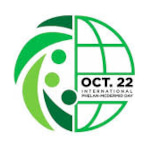International Phelan-McDermid Syndrome Day Date in the current year: October 22, 2026
 International Phelan-McDermid Syndrome Day, also known as International Phelan-McDermid Syndrome Awareness Day, is observed annually on October 22. It was created to raise awareness of a rare genetic disorder that causes global developmental delay and other symptoms.
International Phelan-McDermid Syndrome Day, also known as International Phelan-McDermid Syndrome Awareness Day, is observed annually on October 22. It was created to raise awareness of a rare genetic disorder that causes global developmental delay and other symptoms.Phelan-McDermid syndrome (PMS), also known as 22q13 deletion syndrome, is caused by deletions or rearrangements on the long arm of chromosome 22. These deletions or rearrangements usually lead to the absence of the SHANK3 protein, which plays a vital role in transmitting signals between neurons. Consequently, the clinical manifestations of the syndrome are primarily neurological and behavioral.
Main features include global developmental delay, moderate to severe intellectual disability, absent or severely delayed speech, low muscle tone (hypotonia), motor and coordination issues (poor fine motor skills, unsteady gain), and autism spectrum features such as sensory sensitivities, repetitive behaviors, and social communication difficulties.
Other possible signs and symptoms include sleep disturbances, high pain tolerance, feeding difficulties, gastrointestinal issues, and seizures (in about 25% of cases). Some patients may have characteristic facial features, such as a long or narrow head, full cheeks, a pointed chin, deeply set eyes, and long eyelashes.
Like most genetic conditions, Phelan-McDermid syndrome is incurable. Treatment focuses on alleviating symptoms, supporting development, and improving quality of life. It usually requires the coordinated efforts of a multidisciplinary team of specialists, including a pediatrician or developmental pediatrician, neurologist, geneticist, speech and language therapist, occupational therapist, physical therapist, psychologist or behavioral therapist, and gastroenterologist. Depending on the symptoms present, additional specialists, such as endocrinologists, psychiatrists, sleep specialists, orthopedists, or nutritionists, may be involved.
Early speech, occupational, and physical therapy are essential for improving communication, motor skills, and daily functioning in patients with Phelan-McDermid syndrome. Behavioral and educational interventions address autism-like features and learning difficulties.
Some symptoms and comorbidities require medical management. For instance, seizures are treated with antiepileptic medications; sleep problems may be managed with behavioral strategies or melatonin; feeding or gastrointestinal issues often necessitate dietary adjustments; and low muscle tone benefits from physiotherapy and, in some cases, adaptive equipment.
Phelan-McDermid syndrome is an ultra-rare condition affecting fewer than 2,500 people globally. This rarity makes it difficult to diagnose, especially in regions where genetic testing isn’t easily accessible. International Phelan-McDermid Syndrome Day, established in 2018, aims to raise awareness of this rare syndrome and the importance of its early detection. You can get involved by learning more about the syndrome, sharing what you’ve learned with others, and donating to an organization that supports affected families or funds research.
- Category
- International Observances
- Tags
- International Phelan-McDermid Syndrome Day, International Phelan-McDermid Syndrome Awareness Day, international observances, rare diseases